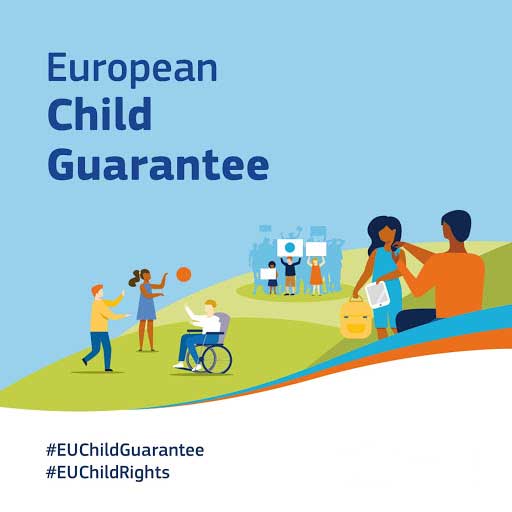On 24th March 2021, the European Commission published the European Child Guarantee, framed in the new EU Child Rights Strategy. The proposal is a milestone which should be used as a catalyst triggering a rethink of national family supports in the EU and putting children and their families at the centre of the COVID-19 recovery plans.
The far-reaching economic, social and health impacts of the COVID-19 pandemic has brought to the fore the necessity to strengthen family support services across Europe. In light of that, the European Child Guarantee was proposed. This Child Guarantee is a unique opportunity to place children and their families at the centre of the COVID-19 recovery plans. Stated in the Child Guarantee, 24 ministers signed a Joint Declaration in December 2020 entitled ‘Overcoming poverty and social exclusion – mitigating the impact of COVID-19 on families – working together to develop prospects for strong children’ already confirming their agreement to a child-focused approach.
COFACE Families Europe therefore calls on the Council of the EU to swiftly adopt this Recommendation, and use it to trigger a profound rethink of national family support policies based on a mix of resources, service and time arrangements to allow families of all types to live in dignity.
In so many fields the solution begins at home. Families can be considered as natural social security systems. We are convinced that children will thrive if their family thrives and if the whole society cares enough to provide for them. Therefore, policies must prioritise investing in children and their families and ensure that adequate and quality support is provided through a systemic two-generation approach with a focus on empowerment, participation, and strengthening competences of all families in their daily lives. An approach which is highlighted in our Child Compass 2030 providing a comprehensive, integrated and long-term strategy.
Moreover, according to the upcoming OECD study on strengthening family support services (join the study launch on 30th March 15-17.00 CET), governments will need to develop longer-term, structural responses to underpin families support services, make them more effective in reaching families in need, strengthen their quality and make good use of modern technology to enhance its reach as well speed of delivery.
The new instrument proposed – a Council recommendation – offers guidance on how to implement the European Child Guarantee, while also allowing Member States the flexibility to design and implement measures, according to their national practices. It now needs to be adopted by the Council of the European Union, and within six months after its adoption, governments will have to send to the Commission national action plans on how to implement the Guarantee with a 2030 timeframe, aligned on the achievement of the Sustainable Development Goals.
It is set within a wider EU Child Rights Strategy, hence the national plans must be fully in line with the UN Convention on the Rights of the Child and the UN Convention on the Rights of Persons with Disabilities. While a Council Recommendation is a soft law instrument, this one is also intrinsically linked to key EU legislative frameworks like the EU work-life balance directive (adopted in 2019, now in transposition phase) and the Digital Services Act (proposed end 2020 and currently discussed by European Parliament and Council of the EU) and the Communication “A Renovation Wave for Europe – greening our buildings, creating jobs, improving lives.
The Commission would monitor its implementation through a mix of tools: appointment of national coordinators, country-specific recommendations, peer reviews, biennial reports from the 27 EU countries, and a progress report 5 years after adoption. Its monitoring and implementation will be explicitly linked to the European Pillar of Social Rights 2030 target to reduce by at least 15 million the number of people at risk of poverty or social exclusion by 2030, including at least 5 million children. As noted in the joint reaction to the Social Pillar Action Plan by the Alliance for Investing in Children, we call on Member States to set in their action plans more ambitious targets to achieve an EU minimum result of lifting 9 million children out of poverty, which would be in coherence with the SDGs target.
In this Recommendation, the Commission strongly encourages Member States to address child social exclusion as a matter of priority. Paragraphs 4 and 5 of the Recommendation invite Member States to guarantee for all children in need effective and free access to accessible and inclusive early childhood education and care, accessible and inclusive education and school-based activities, at least one healthy meal each school day and healthcare. Furthermore, Member States are invited to guarantee for children in need effective access to healthy nutrition and adequate housing, for children and their families, or in community-based or family-based settings. The target groups (“children in need”) of the national plans is to be defined by Member States, but with key guidance in the Recommendation including children with disabilities, children in institutional care, homeless children and their families.
The proposal stresses that although ensuring access to the services is an important part of tackling child social exclusion, it must be set within a broader approach and within an enabling social policy framework. This is reflected throughout the Commission proposal, which highlights children exposed to various risk factors leading to social exclusion such as living in a single parent household, with a parent with disability, in a violent household and more. This recommended investment in key services is complemented by paragraph 6 which makes recommendations for various policies, including measures to support labour market integration measures for parents or guardians and income support to families and households, so that financial or other existing barriers do not prevent children from accessing these quality services.
COFACE will continue monitoring the process closely, together with the European Alliance for Investing in Children, and engaging with national governments in the development of strong national action plans.
Supporting documents:
- Child Compass 2030
- The Child Guarantee: A tool to tackle family poverty? – Event overview, September 2020
- European Commission press release
- European Child Guarantee
- Registration for OECD study launch





